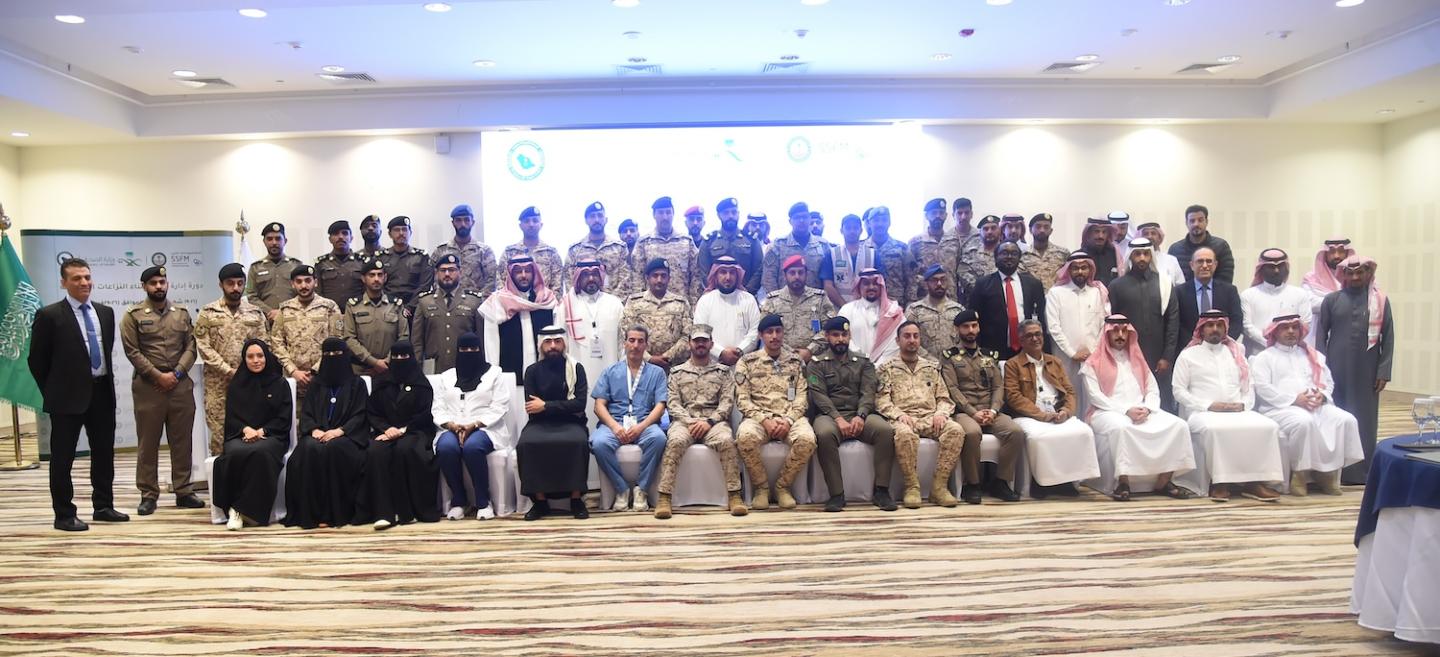Conclusion of the Training Course on “Dead Body Management in Armed Conflict” in Riyadh

The training course on "Dead Body Management in Armed Conflict," hosted by the Standing Committee of International Humanitarian Law, successfully concluded after three days, from February 26 to 29. The course saw a significant turnout of local and international experts, government officials, and representatives from civil sectors related to the field. Feedback from attendees was overwhelmingly positive, with participants and trainees appreciating the course activities and expressing a desire for more similar initiatives. The course aimed to enhance awareness and education in the realm of international humanitarian law and received gratitude towards all the staff of the Standing Committee for their efforts.

Dr. Hamdan Saleh Al-Juhani, Chairman of Media and Publishing Committee of the Standing Committee of International Humanitarian Law, delivered the opening speech on behalf of Counselor Abdullah bin Medrek Alrwaily, Secretary-General of the Standing Committee of International Humanitarian Law, Dr. Al-Juhani highlighted that the training course covered the legal framework and international practices for managing dead bodies in armed conflicts using modern and advanced methods, including the identification of their identities. He further explained that the course topics encompassed forensic odontology, DNA fingerprinting, criminal evidence, handling of corpses and body parts, and offering psychological support to families of the victims.

Al-Juhani further commented: "This course builds upon the national strategic plans outlined by the Standing Committee of International Humanitarian Law in the Kingdom of Saudi Arabia, in collaboration with key stakeholders invested in this domain. He further stated, "The Saudi Arabian International Committee of International Humanitarian Law comprises experts from twelve government agencies overseeing the agreements ratified by the Kingdom in this regard." Al-Juhani also emphasized that the Committee's primary focus is on advancing global endeavors to uphold and enforce international humanitarian law across all international platforms, in times of peace or war, engaging various military and civilian sectors. These efforts are visibly manifested through exemplary humanitarian actions on the ground.

Addressing the attendees and participants of the course, Dr. Ahmed bin Ibrahim Al Yahya, executive director of the Medical Services Center at the Ministry of Health Court, underscored the significance of the training course's outcomes in enhancing efforts to support the psychological and moral well-being of dead individuals' families. He highlighted the importance of incorporating the legal dimension into these efforts. Al Yahya highlighted that the course curriculum was designed according to international standards and frameworks that adhere to the principles outlined in the first, second, and third Geneva Conventions. Additionally, the course benefitted from the expertise of the Red Cross organization, which possesses specialized knowledge enabling the provision of services in alignment with globally recognized international standards.
Al Yahya also highlighted that the course’s focal points encompassed a wide range of perspectives stemming from practical experience in the field. Noteworthy was the collaborative nature of the course, with all participants engaging at different levels and stages of the work, demonstrating a shared commitment to addressing the moral, psychological, humanitarian, and legal dimensions. He emphasized the sensitive nature of the course’s topic, revolving around a crucial humanitarian concern regarding dead individuals and their families. The aim was to elucidate the necessary roles for the families of the dead individuals to bolster psychological well-being and address pertinent legal considerations.

Al-Yahya further remarked, "During the previous period, there was a demand for a training experience like this, with colleagues specialized in forensic evidence, forensic pathology, law, and relevant stakeholders seeking such courses that were not readily accessible within the Kingdom. As a solution, we used to send some colleagues to participate in international conferences and specialized courses hosted by international organizations to equip them with the required skills." Al-Yahya went on to state, "Thankfully, these courses are now being conducted in the Kingdom for the second time, following the collaborative effort of the Standing Committee of International Humanitarian Law with the Medical Services Center at the Ministry of Health and the Saudi Society for Forensic Medicine. The participants include individuals with substantial expertise capable of sharing valuable skills and knowledge for significant benefits, alongside the support of international experts contributing their experiences to enhance the effectiveness of these courses."

Al-Yahya expressed gratitude for the involvement of Saudi experts representing various entities associated with the topic and components of the course, including the Ministries of Defense and Health, the Center for Forensic Medical Services, King Saud University, the College of Dentistry, as well as professionals specializing in crisis and disaster management.
